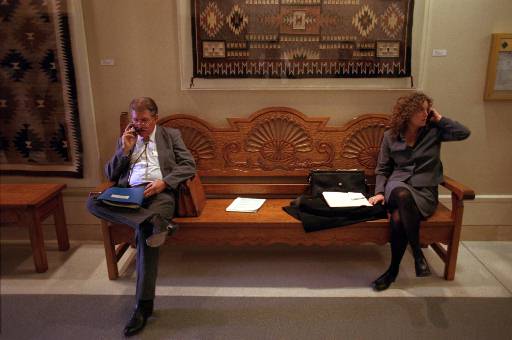The Noerr-Pennington doctrine is a judicially created defense against certain business torts (wrongful acts) for activity that implicates the First Amendment petition right. Created in Eastern Railroad Presidents Conference v. Noerr Motor Freight (1961) and United Mine Workers v. Pennington (1965) and restated in California Motor Transport Co. v. Trucking Unlimited (1972), the doctrine began as a defense against antitrust liability.
Business who petitioned the government for anti-competitive actions are immune from liability
Under the early version of the doctrine, a competitor whose activities ordinarily would have been subject to liability as anti-competitive was immune from liability to the extent that the activities that were the subject of the complaint amounted to a good faith attempt to seek government action, even if the action sought was itself impermissibly injurious to a competitor. Thus, even though a would-be monopolist who attempted to establish a price-fixing cartel would have been subject to anti-trust liability, the same actor who attempted to reach the same result by lobbying for legislation to fix prices would not have been subject to liability.
However, an attempt to seek government intervention that was not intended to yield some official result—such as a proceeding brought to harass a competitor rather than to win a favorable decision—fell within the “sham” exception to the Noerr-Pennington doctrine and would not have been immune from liability.
Some find the doctrine in the First Amendment freedom of petition
There is some debate in the literature about the source of authority for the Noerr-Pennington doctrine. Many commentators argue that the doctrine is an interpretive gloss on federal anti-trust statutes. Others find the doctrine in the First Amendment freedom of petition. Although the Supreme Court has not yet resolved this controversy, the modern trend in the lower courts is to treat the doctrine as a general principle of First Amendment law.
Consistent with the modern trend, petitioners frequently invoke the Noerr-Pennington doctrine to defend their advocacy from liability under a wide variety of business torts. For example, Noerr-Pennington often appears in litigation collateral to land use disputes. Frustrated land developers periodically bring suit against local activists (who have defeated the developers in local legislatures) under various theories, notably for the tort of unlawful interference with contractual relations. These suits, known colloquially as Strategic Lawsuits against Public Participation, or SLAPP suits, ordinarily fall to Noerr-Pennington defenses.
Court proceedings raise a difficulty for those who think the doctrine is applicable beyond anti-trust context
One conceptual difficulty facing those who argue that the Noerr-Pennington doctrine is applicable beyond the anti-trust context is its application to court proceedings. In theory, the right to petition the government for redress of grievances applies equally to petitions brought to the judiciary and those brought to the legislature. Accordingly, the Noerr-Pennington doctrine immunizes businesses from anti-trust liability based on good faith lawsuits brought against competitors.
However, expansion of this application of the doctrine outside the anti-trust context might force the courts to abolish the well-recognized tort of abuse of process. At a minimum, the tort would have to be cut back from its current scope—conferring liability on plaintiffs who file meritless lawsuits for an improper purpose—to apply only to those suits in which the plaintiff intends solely to harass rather than to reach a favorable result.
Noerr-Pennington provides breathing space for political activity against sanctions initiated by private citizens
Noerr-Pennington is significant in the First Amendment landscape as one of the few doctrines that provide breathing space for political activity against sanctions primarily initiated by private citizens rather than the state. The constitutional justification for this expanded sphere of protection is the notion that the state is participating in private censorship by permitting its legal system to be used as a tool to suppress core political communication. This constitutional principle, which was first established to prevent government enforcement of racially discriminatory land transfer covenants in Shelley v. Kraemer (1948), marks out a perennial tension in constitutional law. Vigorous enforcement of constitutional boundaries on government-supported private conduct was a hallmark of the Warren Court, and later courts have substantially narrowed its scope.
This article was originally published in 2009. Paul Gowder is a law professor at Northwestern University Pritzker School of Law and a former civil rights and legal aid lawyer. He is also the author of The Rule of Law in the Real World (Cambridge University Press, 2016).

